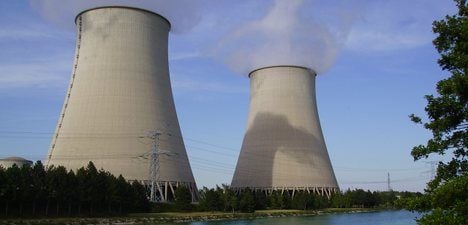In a statement Greenpeace said some members had entered the nuclear site at Nogent-sur-Seine, 95 kilometres southeast of Paris, to “spread the message that there is no such thing as safe nuclear power.”
Eight activists entered the power station site according to a source with the French gendarmerie, the armed police force, who added that some of the intruders had already been apprehended.
“A group of militants managed to climb onto the dome of one of the reactors, where they unfurled a banner saying ‘Safe Nuclear Power Doesn’t Exist’,” said Greenpeace spokesman Axel Renaudin.
“The aim is to show the vulnerability of French nuclear installations, and how easy it is to get to the heart of a reactor,” said Sophia Majnoni, a Greenpeace nuclear expert.
She denounced a government security audit of its nuclear plants as “a communications exercise which does not take into account risks already identified in the past and does not learn the lessons of Fukushima,” the Japanese nuclear plant which was crippled by an earthquake and tsunami.
The Nogent-sur-Seine plant, run by the EDF energy company, was chosen by Greenpeace “because it is the nearest to Paris,” Greenpeace said.
French Industry Minister Eric Besson said that if the dawn intrusion was confirmed it would indicate a dysfunction in the plant’s security system.
“If an enquiry confirms (the break-in) that would mean that there has been a dysfunction and that measures must be taken to ensure that it doesn’t happen again,” the minister said in French radio.
Greenpeace’s action came as UN climate talks entered their second week in South Africa.
Near the Durban conference site six Greenpeace campaigners were arrested as they tried to hang a banner reading “Listen to the People, not the Polluters” at a hotel where a “Global Business Day,” hosted by business organisations, was taking place.



 Please whitelist us to continue reading.
Please whitelist us to continue reading.